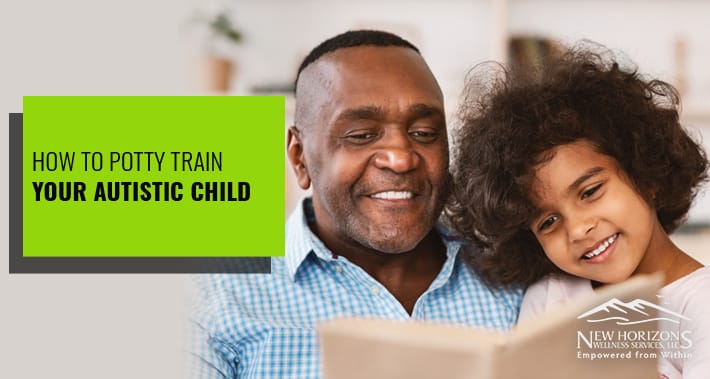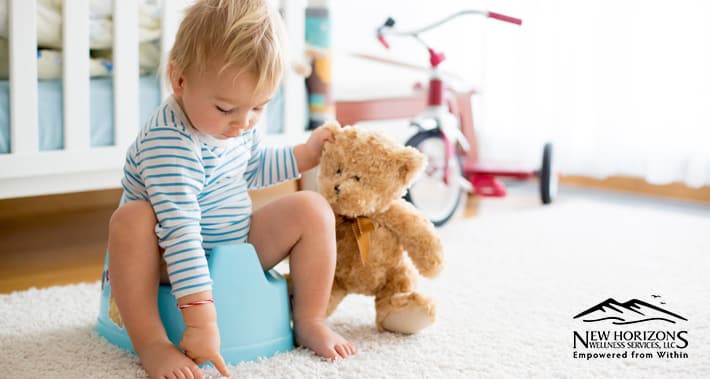
Potty training can be a stressful process for both parent and child.
For children who are on the autism spectrum, however, this process can be especially challenging.
Sensory overstimulation, poor motor skills and differences in cognitive skills, as well as difficulty communicating are all challenges that autistic children and their parents may face when potty training.
If you are thinking about potty training your autistic child, understanding autism spectrum disorder and the unique challenges that autistic children face while potty training is extremely important.
Here at New Horizons Wellness Services, one of the many services we offer is occupational therapy for autism, which often includes potty training for autistic children.
Let’s take a closer look at these challenges, as well as the strategies that you can use to make the potty training process run as smoothly as possible.
Is It Possible To Potty Train An Autistic Child?
With a lot of patience, structure, and reinforcement, it is possible to potty train an autistic child.
However, while conventional knowledge suggests that it’s a good idea to start potty training allistic children between 18 months and 3 years old, there is no specific age that autistic children should begin potty training.
Instead, it depends on your child’s skills.
For example, fine motor skills to be able to carry out their bathroom routine, the ability to pull down their pants and underwear, and the ability to sit on the potty are all requirements for successful potty training.
It’s also important to make sure your child doesn’t have any medical conditions which might affect their ability to go to the bathroom before you begin potty training.
Related: Getting A Better Understanding Of Autism Spectrum Disorder.
Why Is It Difficult To Potty Train An Autistic Child?
Autistic children face unique challenges when learning to use the potty.
Two of the most common challenges concern interoceptive awareness and too little water intake.
1. Interoceptive Awareness
All humans have receptors throughout our bodies.
These receptors gather information from inside our bodies to send signals to our brains.
For some people with autism, the signals being sent to the brain are not processed correctly and the child may not be able to sense when they need to go to the bathroom.
This is also one of the symptoms of sensory processing disorder, a disorder that causes issues with the part of the brain that processes sensory inputs.
2. Not Drinking Enough Water
When we don’t drink enough water, our colonic motility slows down.
This means both urination and bowel movements slow down, and bowel movements become harder, denser, and drier.
When this happens, bowel movements become painful and may make potty training more challenging.
Children in general tend not to drink enough water.
However, some autistic people have described not feeling thirsty, and as a result may be more likely to become dehydrated as a result.
The reason for this is the lack of interoceptive awareness, as mentioned above.
When Should You Start Potty Training?
There are numerous signs of potty training readiness that you can look for in your child, such as:
- Taking off or vocalizing displeasure for dirty diapers
- Showing interest in the toilet by sitting on or flushing it, or watching an adult use it
- Taking an adult to the bathroom to get a clean diaper
- Getting a diaper when needing to eliminate
- Going off to a quiet spot for toileting
- Asking to be changed when in a dirty diaper
- Having a pattern for elimination, such as going pee every few hours
- Remaining dry at night

How To Potty Train Your Autistic Child
In order to minimize frustration, it is important to approach the potty training process in phases.
During the preplanning phase, you should gather all essential materials needed for a positive potty experience, such as a potty, timer, wipes, and your child’s favorite books or toys.
Next comes the setting up phase, which requires you to pick one bathroom in the house where the child is most comfortable and make it potty training ready.
This phase includes placing all the materials gathered during the preplanning phase and placing them in the designated bathroom.
The final phase is the implementation phase and requires lots of time, structure, consistency, and patience.
You should start with setting a time that potty training will begin and prepare a visual countdown for your child a week in advance.
You may choose to have a “potty party” in order to say “bye bye” to diapers and “hello” to underwear.
Ultimately, it is most important to remain patient with your child and plan for setbacks.
Now, let’s learn some of the techniques that you can use to make potty training your autistic child easier.
1. Use Encouragement And Rewards
Once your child learns each phase of the potty training process, you should reward them with praise.
The praise can either be verbal, such as saying “well done going potty”, or nonverbal, such as clapping or thumbs up.
You may also give your child a sticker or their favorite activity for a reward.
Make sure your child understands why they are getting the reward and cut back on the rewards once they have mastered a step.
2. Use Visual Supports
Autistic children are often visual learners.
Therefore, using visual supports to show your child steps in using the toilet may be helpful in the potty training process.
Show your child pictures that depict the potty training process and explain each phase to them with aid of the pictures.
You may also tape a schedule on the outside wall of the bathroom so your child can see their progress.
3. Use A Social Stories Approach
Social stories teach social expectations to autistic children, as well as help them cope with challenging situations.
Practice new social stories with your child when they are going to a new environment where they may have to use the potty, such as a friend’s house.
Speech therapists, occupational therapists, and school teachers can all help to create social stories for your child.
How To Deal With Setbacks When Potty Training Your Autistic Child
When it comes to potty training, setbacks are to be expected for all children.
If your child is exhibiting behavioral challenges during potty training, a psychologist or occupational therapist can help you develop strategies to overcome these challenges.
Some autistic children are selective eaters, and thus are more prone to constipation.
If you think your child is struggling to use the potty due to constipation, see a pediatrician to rule out any underlying medical problems and to help develop strategies.
Sometimes, progress stalls for no obvious reason.
If this happens, keep a record of the times your child has had an accident for a week.
If a pattern of accidents happens, start taking your child to the toilet around the time the accidents typically happen.
Book Your Appointment With New Horizons Wellness Services Today
Are you and your child struggling to master potty training?
We can help you develop a potty training plan that works.
Book your appointment with New Horizons Wellness Services today.
Yours in Health,
New Horizons Wellness Services13333 SW 68th Pkwy,
Tigard, OR 97223
- https://g.page/newhws
New Horizons Wellness Services provides a true multidisciplinary approach to mental & physical health treatments for children, adults and families.
